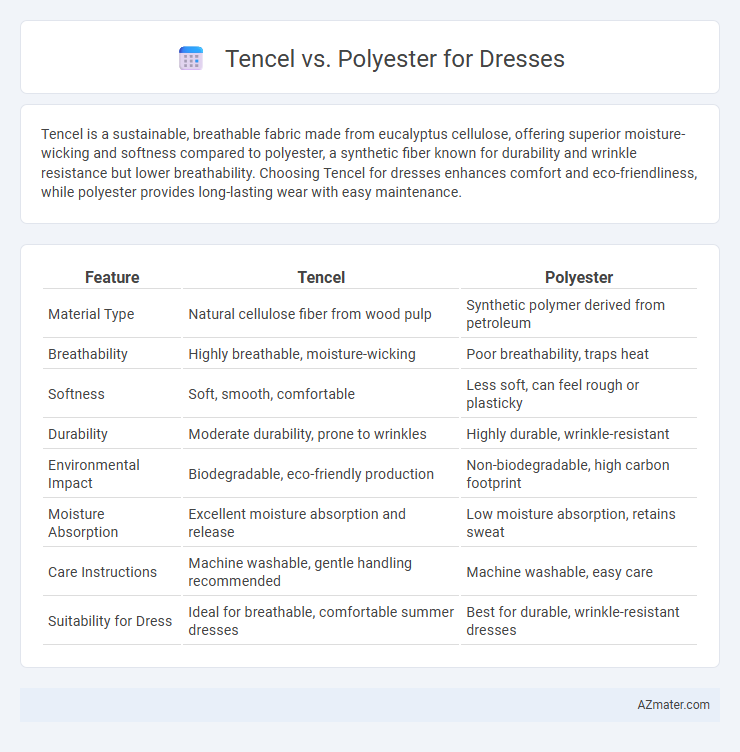Tencel is a sustainable, breathable fabric made from eucalyptus cellulose, offering superior moisture-wicking and softness compared to polyester, a synthetic fiber known for durability and wrinkle resistance but lower breathability. Choosing Tencel for dresses enhances comfort and eco-friendliness, while polyester provides long-lasting wear with easy maintenance.
Table of Comparison
| Feature | Tencel | Polyester |
|---|---|---|
| Material Type | Natural cellulose fiber from wood pulp | Synthetic polymer derived from petroleum |
| Breathability | Highly breathable, moisture-wicking | Poor breathability, traps heat |
| Softness | Soft, smooth, comfortable | Less soft, can feel rough or plasticky |
| Durability | Moderate durability, prone to wrinkles | Highly durable, wrinkle-resistant |
| Environmental Impact | Biodegradable, eco-friendly production | Non-biodegradable, high carbon footprint |
| Moisture Absorption | Excellent moisture absorption and release | Low moisture absorption, retains sweat |
| Care Instructions | Machine washable, gentle handling recommended | Machine washable, easy care |
| Suitability for Dress | Ideal for breathable, comfortable summer dresses | Best for durable, wrinkle-resistant dresses |
Introduction to Tencel and Polyester
Tencel, a sustainable fabric made from wood pulp using environmentally friendly processes, offers exceptional breathability, moisture-wicking properties, and softness ideal for dressmaking. Polyester, a synthetic fiber derived from petroleum, is known for its durability, wrinkle resistance, and affordability, but lacks natural breathability compared to Tencel. Choosing between Tencel and polyester depends on priorities such as sustainability, comfort, and fabric performance in dress applications.
What is Tencel?
Tencel is a brand name for lyocell fiber, produced from sustainably sourced wood pulp, primarily eucalyptus trees, known for its environmentally friendly production process. This biodegradable fiber offers excellent breathability, moisture-wicking properties, and a soft, smooth texture, making it an ideal choice for dress materials. Compared to polyester, Tencel provides superior comfort, better temperature regulation, and enhanced durability, while being more eco-conscious.
What is Polyester?
Polyester is a synthetic fiber made from petroleum-based polymers, widely used in dress manufacturing due to its durability, wrinkle resistance, and color retention. Unlike natural fibers, polyester is hydrophobic, making it less breathable but quick-drying, ideal for activewear and affordable fashion. Its production involves significant energy consumption and environmental impact, prompting a rise in recycled polyester options for more sustainable dress fabrics.
Comfort and Breathability Comparison
Tencel fabric, made from sustainably sourced wood pulp, offers superior breathability and moisture-wicking properties, making it ideal for comfortable dresswear in warm climates. Polyester, a synthetic fiber, tends to trap heat and moisture, often resulting in less comfort and reduced airflow during extended wear. The natural cellulosic structure of Tencel enhances air circulation and softness, significantly outperforming polyester in comfort and breathability for dresses.
Moisture-Wicking Abilities
Tencel exhibits superior moisture-wicking abilities compared to polyester, efficiently absorbing and releasing moisture to keep the skin dry and comfortable during extended wear. Polyester, while quick-drying, tends to trap moisture against the skin, which may cause discomfort and odor buildup. The natural fibers in Tencel enhance breathability and moisture management, making it an ideal choice for dresses intended for warm or active conditions.
Durability and Longevity
Tencel fabrics offer superior breathability and biodegradability, making them an eco-friendly choice for dresses, but they generally have moderate durability compared to synthetic fibers. Polyester excels in durability and longevity, resisting wrinkles, shrinking, and stretching, which makes it ideal for long-lasting dresswear. While Tencel provides a softer feel and better moisture management, polyester's resilience ensures extended garment life under frequent wear and washing.
Sustainability and Eco-Friendliness
Tencel, made from sustainably sourced eucalyptus wood pulp, is highly biodegradable and produced through a closed-loop process that recycles water and solvents, minimizing environmental impact. Polyester, derived from non-renewable petroleum, contributes significantly to microplastic pollution and requires more energy-intensive production, making it less eco-friendly. Choosing Tencel for dresses supports sustainable fashion by reducing carbon footprint and promoting renewable materials over synthetic alternatives.
Care and Maintenance Requirements
Tencel dresses require gentle care, typically needing cold water washing and air drying to maintain their softness and prevent shrinking, with minimal ironing needed due to their wrinkle resistance. Polyester dresses are more durable and easier to maintain, often machine washable at higher temperatures and quick-drying, yet they may retain odors and require low-heat ironing to avoid melting fibers. Choosing between Tencel and polyester for dress care depends on prioritizing natural fiber maintenance versus synthetic fabric durability and convenience.
Cost and Accessibility
Tencel dresses typically cost more due to the sustainable production process and natural fibers, making them less accessible in budget-conscious markets compared to polyester. Polyester dresses are widely available and more affordable because of cheaper synthetic materials and mass production methods. Consumers prioritizing cost and easy accessibility often lean toward polyester options for everyday wear.
Which Fabric is Best for Dresses?
Tencel, derived from sustainable wood pulp, offers breathability, moisture-wicking, and a soft, smooth texture ideal for dress comfort and skin sensitivity. Polyester, a synthetic fiber, provides durability, wrinkle resistance, and vibrant color retention but can trap heat and moisture, making it less breathable for extended wear. For dresses prioritizing comfort, sustainability, and breathability, Tencel is the superior choice, while polyester suits designs needing long-lasting wrinkle resistance and vivid color preservation.

Infographic: Tencel vs Polyester for Dress
 azmater.com
azmater.com